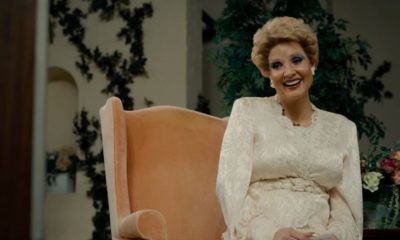(16)
The concept of fake movies is a regular gag in films and TV shows about filmmaking and fictional Hollywood figures. Trailers for these non-existent works are especially fun, more so now that they can go viral on the Internet. But not all fake movies are conceived as parodies within real movies like “Tropic Thunder” and “Funny People.” Sometimes they’re a method of deception, positively or negatively, for some actual real-world purpose. The new film “Argo,” for instance, depicts the true story of a rescue mission to free hostages in Iran, which involved a pretend production of sci-fi movie as a cover.
Other real-life fake movies have come before and after the one seen in “Argo,” whether they were the work of governments, con men, marketing companies or sneaky romantics. As a bonus, one of the following examples even has a direct tie to the new movie, which was directed by and stars Ben Affleck.
VIDEOS/PHOTOS:
-
The FBI Goes Hollywood in ‘The Last Shot’ (2004)
Like ‘Argo,’ this movie starring Alec Baldwin and Matthew Broderick depicts an actual government operation. However, in this case, the plot is “inspired by a true story” and the fake movie depicted on screen is a fictionalized amalgam of real-life fake titles such as ‘The Knockover’ and ‘The Convention,’ both devised by Agent Garland Schweickhardt for an FBI sting called Dramex (short for Drama Expose), which went after the mob via corrupt Teamsters. Like Broderick’s first-time director character in the movie, screenwriters Dan Lewk and Gary Levy were as in the dark as the guys under surveillance. Dramex ultimately led to a number of arrest but the convictions were predictably disappointing, partly because some of those indicted mobsters died before they could go to jail.
-
Constantin Films Secures Rights via ‘The Fantastic Four’ (1994)
If you’ve ever seen — but wished you hadn’t — any of the Roger Corman production of Marvel’s super-powered quartet, you might be wondering how it qualifies as a “fake movie.” Well, although it was completed, the comic book adaptation was never officially released and wasn’t ever intended to be. Constantin Films only made the thing — as cheaply as possible while still maintaining the appearance of seriousness — to hold onto the rights to the ‘Fantastic Four’ property. Even the actors thought they were involved in a legitimate work, as did the public since the movie was heavily promoted to go along with the ruse. It’s hard to imagine anyone would be allowed to do this today, and in the end, the official ‘Fantastic Four’ movie and sequel produced a decade later weren’t really all that great either.
-
Seigmund Lubin Tricks Thomas Edison (c. 1904)
One of the early pioneers of cinema, Siegmund Lubin was also a notorious plagiarist, going so far as to copy Edwin S. Porter and Thomas Edison’s The Great Train Robbery. While competition and legal battles over patents and copyrights were typical for the movies at the turn of the 20th century, Edison was more cutthroat than other rivals and sued Lubin multiple times before giving up and taking matters into his own hands — or the hands of his thugs, that is. Eventually Lubin began throwing these heavies off his trail by regularly distracting them with fake film crews and cameras. In spite of legal and financial troubles, he was able to continue as a movie producer through the 1910s.
-
Britney Spears, Nick Nolte and Geddy Watanabe are the Literal Dream Cast of ‘There for Hope’ (2010)
Never mind “fake” movies, the issue of fraudulent movies has been on the rise in recent years, with cold calls for investors leading to many people getting duped and swindled out of thousands of dollars by Hollywood producers. Some companies, such as the infamous Cinamour Entertainment, actually go through with producing the movies they seek financing for, but these tend to be low-budget efforts paid for with only a fraction of the amount they’ve scammed out of folks. ‘There For Hope,’ meanwhile, has never existed, whether or not this is because the guys behind it were arrested. One thing’s for certain, in spite of what it said on their website and IMDb and elsewhere, the Iraq War vet romantic comedy never truly involved the alleged casting of Britney Spears, Martin Sheen (later replaced by Robert Duvall), Nick Nolte, Jennifer Hudson, Geddy Watanabe, Diane Ladd or any of the other high profile stars that were name dropped to investors.
-
A New Superhero Is Revealed to be a Superhoax with ‘Gundala’ (2008)
Indonesian wedding videographer Iskander Salim didn’t mean to scam anyone out of money, only to spark a debate in his country regarding the lack of superheroes there. The conversation began with the appearance of a movie poster, then a webpage, a Facebook listing and other social media components as well as a Wikipedia entry. Though Salim didn’t intend any harm, he did use a pre-existing superhero, Gundala, in order to gauge reactions from fans via message boards and blogs. Even better, it’s possible he might have helped jumpstart the current plans for a real Gundala adaptation.
-
Girls are Tricked into Practicing Birth Control by ‘2028’ (2010)
Similarly, movie posters went up all around Milwaukee a few years ago, as did billboard and bus stop ads, for an intriguing horror film. It was also promoted on websites and in radio spots, had an authentic-looking trailer and Facebook page as well as a Wikipedia listing of its own. Once the population was good and curious, they found out all the marketing led them to a PSA intended to combat teen pregnancy. The fake movie’s title, you see, is the year their unwanted child would be 18 and presumably in jail. Did the campaign work? Honestly, we can’t imagine anyone likes being preached to in the form of deception.
-
Joaquin Phoenix and Casey Affleck Were Making a Different Movie with ‘I’m Still Here’ (2010)
When Joaquin Phoenix told the world he was quitting acting in order to become a rapper called J.P., everyone thought it was a joke. Then he kept at it, performing live and acting crazy on talk shows, all the while apparently having his life change documented by his friend, Casey Affleck. It turned out that the movie was real, but the documentary everyone expected was not. It was all indeed a joke intended to make a statement about fame or something. Once again, we can’t imagine anyone likes a message communicated through deception.
-
The Best Reason for a Fake Movie Production (2011)
For all we know, this could be a fake-fake movie, but we’re romantics and so we’ll take a guy at his word that he truly proposed to his girlfriend at L.A.’s Griffith Park while she thought the two of them were featured background extras on a legitimate film shoot. The groom-to-be (presumably now a husband) hired a director and two principal actors to make the scene seem authentic and out of the blue during a regular hike. And… she did say yes. Because true romance trumps an act of deception of this sort in this case only.
-
Original Filmmakers Depicting the ‘Argo’ Story Were in the Dark with ‘Escape from Iran: The Canadian Caper’ (1981)
Producer Les Harris has made two documentaries about the hostage crises depicted in ‘Argo,’ as well as a successful Canadian TV movie portraying the events. But he did the latter more than 30 years ago, and the information about the mission involving a fake movie production wasn’t made public until 1997. The story Harris was told had to do with the hostages pretending to be in the business of grain export. So, in a way, that old version was about a fake movie, it just didn’t know it was about a fake movie. At least later he got to assist in the research for the story behind ‘Argo’ — that which wasn’t erroneous anyway.







